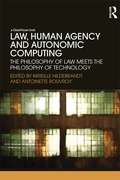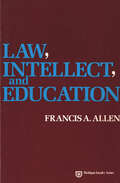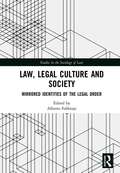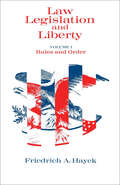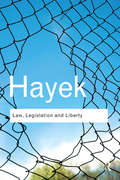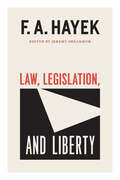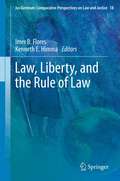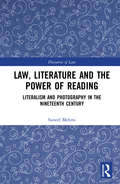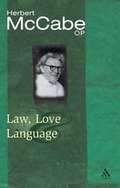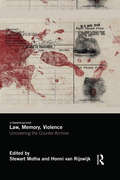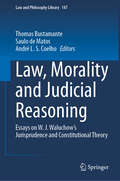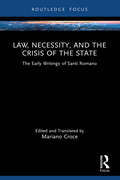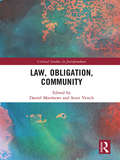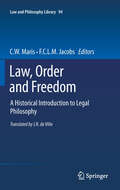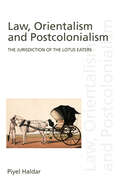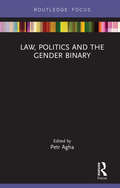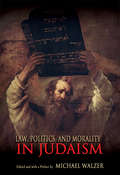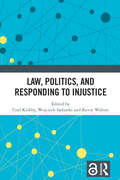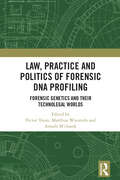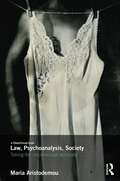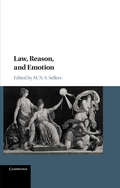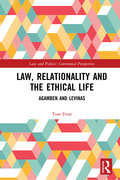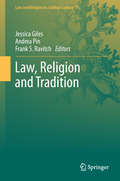- Table View
- List View
Law, Human Agency and Autonomic Computing: The Philosophy of Law Meets the Philosophy of Technology
by Mireille Hildebrandt Antoinette RouvroyLaw, Human Agency and Autonomic Computing interrogates the legal implications of the notion and experience of human agency implied by the emerging paradigm of autonomic computing, and the socio-technical infrastructures it supports. The development of autonomic computing and ambient intelligence – self-governing systems – challenge traditional philosophical conceptions of human self-constitution and agency, with significant consequences for the theory and practice of constitutional self-government. Ideas of identity, subjectivity, agency, personhood, intentionality, and embodiment are all central to the functioning of modern legal systems. But once artificial entities become more autonomic, and less dependent on deliberate human intervention, criteria like agency, intentionality and self-determination, become too fragile to serve as defining criteria for human subjectivity, personality or identity, and for characterizing the processes through which individual citizens become moral and legal subjects. Are autonomic – yet artificial – systems shrinking the distance between (acting) subjects and (acted upon) objects? How ‘distinctively human’ will agency be in a world of autonomic computing? Or, alternatively, does autonomic computing merely disclose that we were never, in this sense, ‘human’ anyway? A dialogue between philosophers of technology and philosophers of law, this book addresses these questions, as it takes up the unprecedented opportunity that autonomic computing and ambient intelligence offer for a reassessment of the most basic concepts of law.
Law, Intellect, and Education (Michigan Faculty Series)
by Francis A. AllenIn Law, Intellect, and Education, Francis A. Allen presents a compelling collection of essays that argue for an education system grounded in intellectual rigor and humanistic motivation. Spanning nearly thirty years, these essays collectively defend the importance of a liberal and professional education that is under threat in the modern world. Allen, drawing from his extensive involvement with the Association of American Law Schools, underscores the need to advocate for this education, asserting its critical role in developing thoughtful and rational legal minds. The book delves into key themes in essays like "Mr. Justice Holmes and 'The Life of the Mind'," which critiques the separation of legal theory from moral considerations, and "On Winning and Losing," which examines the cultural fixation on success within the legal profession. Allen also reflects on past legal thought, such as Jerome Frank's "Law and the Modern Mind," to address the continuing relevance of recognizing human limitations in judicial processes. Throughout, Allen calls for a renewed commitment to cultivating intellectual discipline, emphasizing its necessity in achieving justice and fulfilling the demands of a complex legal system.
Law, Legal Culture and Society: Mirrored Identities of the Legal Order (Studies in the Sociology of Law)
by Alberto FebbrajoThis volume addresses the pluralistic identity of the legal order. It argues that the mutual reflexivity of the different ways society perceives law and law perceives society eclipses the unique formal identity of written law. It advances a distinctive approach to the plural ways in which legal cultures work in a modern society, through the metaphor of the mirror. As a mirror of society, it distinguishes between the structure and function of legal culture within the legal system, and the external representation of law in society. This duality is further problematized in relation to the increasing transnationalisation of law. Based on a multi-level interpretation of the concept of legal culture, the work is divided into three parts: the first addresses the mutual reflections of social and legal norms that support a pluralist representation of internal legal cultures, the second concentrates on the external legal cultures that constantly enable pragmatic adjustments of the legal order to its social environment, and the third concludes the book with a theoretical discussion of the issues presented.
Law, Legislation and Liberty, Volume 1: Rules and Order (Law, Legislation and Liberty)
by Friedrich A. HayekFrom a Nobel Laureate economist, “after more than half a century, Rules and Order remains an essential book for anybody interested in politics or law” (EconLib).F. A. Hayek made many valuable contributions to the field of economics as well as to the disciplines of philosophy and politics. This volume represents the first section of Hayek’s comprehensive three-part study of the relations between law and liberty. Rules and Order constructs the framework necessary for a critical analysis of prevailing theories of justice and of the conditions which a constitution securing personal liberty would have to satisfy.
Law, Legislation and Liberty: A new statement of the liberal principles of justice and political economy (Routledge Classics)
by F. A. HayekWith a new foreword by Paul Kelly 'I regard Hayek's work as a new opening of the most fundamental debate in the field of political philosophy' – Sir Karl Popper 'This promises to be the crowning work of a scholar who has devoted a lifetime to thinking? about society and its values. The entire work must surely amount to an immense contribution to social and legal philosophy' - Philosophical Studies Law, Legislation and Liberty is Hayek's major statement of political philosophy and one of the most ambitious yet subtle defences of a free market society ever written. A robust defence of individual liberty, it is also crucial for understanding Hayek’s influential views concerning the role of the state: far from being an innocent bystander, he argues that the state has an important role to play in defending the norms and practices of an ordered and free society. His arguments had a profound influence on the policies of Thatcher in the 1980s and resonate today in visions of the ‘Big Society’. First published in three separate volumes, this Routledge Classics edition makes one of his most important books available in a single volume. Essential reading for understanding the background to the recent world economic turmoil and financial crisis, it also foreshadows the subsequent heated debate about regulation and political governance if such disasters are to be avoided in the future.
Law, Legislation, and Liberty, Volume 19: A New Statement Of The Liberal Principles Of Justice And Political Economy (Routledge Classics Ser. #19)
by F.A. HayekA new edition of F. A. Hayek’s three-part opus Law, Legislation, and Liberty, collated in a single volume In this critical entry in the University of Chicago’s Collected Works of F. A. Hayek series, political philosopher Jeremy Shearmur collates Hayek’s three-part study of law and liberty and places Hayek’s writings in careful historical context. Incisive and unrestrained, Law, Legislation, and Liberty is Hayek at his late-life best, making it essential reading for understanding the philosopher’s politics and worldview. These three volumes constitute a scaling up of the framework offered in Hayek’s famed The Road to Serfdom. Volume 1, Rules and Order, espouses the virtues of classical liberalism; Volume 2, The Mirage of Social Justice, examines the societal forces that undermine liberalism and, with it, liberalism’s capacity to induce “spontaneous order”; and Volume 3, The Political Order of a Free People, proposes alternatives and interventions against emerging anti-liberal movements, including a rule of law that resides in stasis with personal freedom. Shearmur’s treatment of this challenging work—including an immersive new introduction, a conversion of Hayek’s copious endnotes to footnotes, corrections to Hayek’s references and quotations, and the provision of translations to material that Hayek cited only in languages other than English—lends it new importance and accessibility. Rendered anew for the next generations of scholars, this revision of Hayek’s Law, Legislation, and Liberty is sure to become the standard.
Law, Liberty and State
by Thomas Poole David Dyzenhaus Dyzenhaus, David and Poole, Thomas"Oakeshott, Hayek and Schmitt are associated with a conservative reaction to the 'progressive' forces of the twentieth century. Each was an acute analyst of the juristic form of the modern state and the relationship of that form to the idea of liberty under a system of public, general law. Hayek had the highest regard for Schmitt's understanding of the rule of law state despite Schmitt's hostility to it, and he owed the distinction he drew in his own work between a purpose-governed form of state and a law-governed form to Oakeshott. However, the three have until now rarely been considered together, something which will be ever more apparent as political theorists, lawyers and theorists of international relations turn to the foundational texts of twentieth-century thought at a time when debate about liberal democratic theory might appear to have run out of steam"--
Law, Liberty, and the Rule of Law
by Imer B. Flores Kenneth E. HimmaIn recent years, there has been a substantial increase in concern for the rule of law. Not only have there been a multitude of articles and books on the essence, nature, scope and limitation of the law, but citizens, elected officials, law enforcement officers and the judiciary have all been actively engaged in this debate. Thus, the concept of the rule of law is as multifaceted and contested as it's ever been, and this book explores the essence of that concept, including its core principles, its rules, and the necessity of defining, or even redefining, the basic concept. Law, Liberty, and the Rule of Law offers timely and unique insights on numerous themes relevant to the rule of law. It discusses in detail the proper scope and limitations of adjudication and legislation, including the challenges not only of limiting legislative and executive power via judicial review but also of restraining active judicial lawmaking while simultaneously guaranteeing an independent judiciary interested in maintaining a balance of power. It also addresses the relationship not only between the rule of law, human rights and separation of powers but also the rule of law, constitutionalism and democracy.
Law, Literature and the Power of Reading: Literalism and Photography in the Nineteenth Century
by Suneel MehmiAt the intersection of law, literature and history, this book interrogates how a dominant contemporary idea of law emerged out of specific ideas of reading in the nineteenth century. Reading shapes our identities. How we read shapes who we are. Reading also shapes our conceptions of what the law is, because the law is also a practice of reading. Focusing on the works of key Victorian writers closely associated with legal practice, this book addresses the way in which the identity of the reader of law has been modelled on the identity of the political elite. At the same time, it shows how other readers of law have been marginalized. The book thus shows how a construction of the law has emerged from the ordering of a power that discriminates between different readers and readings. More specifically, and in response to the emerging media of photography – and, with it, potentially subversive ideas of exposure and visibility – the book shows that there have been dominant, hidden and unrecognised guides to legal reading and to legal thought. And in making these visible, the book also aims to make them contestable. This secret history of law will appeal to legal historians, legal theorists, those working at the intersection of law and literature and others with interests in law and the visual.
Law, Love and Language
by Herbert MccabeWhat is ethics all about? In this book Herbert McCabe suggests that it is about loving, obeying laws and talking to people. In doing so, he offers an introduction to ethical thinking for anyone with a serious interest in moral philosophy. He does so as someone who writes with a Christian audience in mind. Most of his arguments, however, do not presuppose a believing Christian readership.
Law, Memory, Violence: Uncovering the Counter-Archive
by Stewart Motha Honni Van RijswijkThe demand for recognition, responsibility, and reparations is regularly invoked in the wake of colonialism, genocide, and mass violence: there can be no victims without recognition, no perpetrators without responsibility, and no justice without reparations. Or so it seems from law’s limited repertoire for assembling the archive after ‘the disaster’. Archival and memorial practices are central to contexts where transitional justice, addressing historical wrongs, or reparations are at stake. The archive serves as a repository or ‘storehouse’ of what needs to be gathered and recognised so that it can be left behind in order to inaugurate the future. The archive manifests law’s authority and its troubled conscience. It is an indispensable part of the liberal legal response to biopolitical violence. This collection challenges established approaches to transitional justice by opening up new dialogues about the problem of assembling law’s archive. The volume presents research drawn from multiple jurisdictions that address the following questions. What resists being archived? What spaces and practices of memory - conscious and unconscious - undo legal and sovereign alibis and confessions? And what narrative forms expose the limits of responsibility, recognition, and reparations? By treating the law as an ‘archive’, this book traces the failure of universalised categories such as 'perpetrator', 'victim', 'responsibility', and 'innocence,' posited by the liberal legal state. It thereby uncovers law’s counter-archive as a challenge to established forms of representing and responding to violence.
Law, Morality and Judicial Reasoning: Essays on W. J. Waluchow’s Jurisprudence and Constitutional Theory (Law and Philosophy Library #147)
by Thomas Bustamante Saulo De Matos André L. S. CoelhoThis book provides a critical outlook on, and an inquiry into the practical implications of, the works of Professor W.J. Waluchow, one of the most important jurisprudence scholars of the early twenty-first century, while also reflecting on the interconnections between his legal theory and his theory of constitutional interpretation. It also features an interview with Waluchow, in which he responds to some of the chapters and shares a first-person perspective on his main philosophical ideas, how they emerged, and how they can be further developed and applied. The book makes a valuable contribution to contemporary legal philosophy by asking and providing different answers (from prominent legal philosophers and newer scholars in the field) to questions such as ‘How does Waluchow’s jurisprudence relate to his theories of legal reasoning and constitutional interpretation?’, ‘On what terms should we understand inclusive legal positivism?’, ‘Can inclusive legal positivism be reconciled with an interpretivist theory of adjudication?’, ‘How does it compare with Raz’s model of legal authority?’, ‘Can Waluchow’s notion of “community constitutional morality” be applied to contexts such as international law, pluralist legal communities, and indigenous laws?’, and ‘Is Waluchow’s methodology equipped to provide interpretive directives in unstable and extremely unequal legal systems?’. The chapters, all written by experts on jurisprudence (including some of the scholars who helped develop the tradition known as inclusive legal positivism), offer a unique analysis of Waluchow’s most complex and intriguing theses, providing not only a valuable exegetical analysis of his work but also a range of answers to the challenge of interpreting legal and constitutional values, as well as practical resolutions to persisting controversies in the philosophy of law.
Law, Necessity, and the Crisis of the State: The Early Writings of Santi Romano (Law and Politics)
by Mariano CroceThis book contains the first English translations of Santi Romano’s important essays, ‘On the Decree Laws and the State of Siege During the Earthquakes in Messina and Reggio Calabria’ (1909) and ‘The Modern State and its Crisis’ (1910). Before Santi Romano wrote his masterpiece The Legal Order in 1917–18, he lay the foundations for his ground-breaking theory of law in these two essays, which are still central to scholarly debates about his legacy. The main focus of ‘On the Decree Laws’ is the concept of necessity as a source of law. Such a controversial view anticipated the much more renowned conception of the state of exception advanced later by Carl Schmitt in his Political Theology and has provided a reference point for Giorgio Agamben. The second essay, ‘The Modern State and its Crisis’, is concerned with the emergence of social forces that the early 20th-century administrative state was struggling to tame. Pursuing an insight that he would develop in The Legal Order, Romano argued that a solution could be found in a public law theory that was able to reconcile the need for a shared constitutional frame with the internal orderings of nonstate movements. Indispensable for contemporary scholars to understand how Romano’s most revolutionary notions came about, as well as to fully appreciate the theoretical import of his concept of law, this book will appeal to legal and political theorists and others who are interested in how law deals and should deal with emergencies and social crises.
Law, Obligation, Community (Critical Studies in Jurisprudence)
by Scott Veitch Daniel MatthewsAgainst an ever-expanding and diversifying ‘rights talk’, this book re-opens the question of obligation from not only legal but also ethical, sociological and political perspectives. Its premise is that obligation has a primacy ahead of rights, because rights attach to practices and modes of being that are already saturated with obligations. Obligations thus lie at the core not just of law but of community. Yet the distinctive meanings, range and situations of obligation have tended to remain under-theorised in legal scholarship. In response, this book examines the sense in which we are multiply ‘bound beings’, to law and legal institutions, as much as we are to place, community, memory and the various social institutions that give shape to collective life. Sharing this set of concerns, each of the international group of scholars contributing to this volume traces the specificity of the binding force of obligations, their techniques and modes of expression, as well as their centrally important role in giving form to lawful relations. Together they provide an innovative and challenging contribution to legal scholarship: one that will also be of relevance to those working in politics, philosophy and social theory.
Law, Order and Freedom
by J.R. de Ville C. W. Maris F.C.L.M. JacobsThe central question in legal philosophy is the relationship between law and morality. The legal systems of many countries around the world have been influenced by the principles of the Enlightenment: freedom, equality and fraternity. The position is similar in relation to the accompanying state ideal of the democratic constitutional state as well as the notion of a welfare state. The foundation of these principles lies in the ideal of individual autonomy. The law must in this view guarantee a social order which secures the equal freedom of all. This freedom is moreover fundamental because in modern pluralistic societies a great diversity of views exist concerning the appropriate way of life. This freedom ideal is however also strongly contested. In Law, Order and Freedom, a historical overview is given pertaining to the question of the extent to which the modern Enlightenment values can serve as the universal foundation of law and society.
Law, Orientalism and Postcolonialism: The Jurisdiction of the Lotus-Eaters
by Piyel HaldarFocusing on the ‘problem’ of pleasure Law, Orientalism and Postcolonialism uncovers the organizing principles by which the legal subject was colonized. That occidental law was complicit in colonial expansion is obvious. What remains to be addressed, however, is the manner in which law and legal discourse sought to colonize individual subjects as subjects of law. It was through the permission of pleasure that modern Western subjects were refined and domesticated. Legally sanctioned outlets for private and social enjoyment instilled and continue to instil within the individual tight self-control over behaviour. There are, however, states of behaviour considered to be repugnant to, and in excess of, modern codes of civility. Drawing on a broad range of literature, (including classical jurisprudence, eighteenth century Orientalist scholarship, early travel literature, and nineteenth century debates surrounding the rule of law), yet concentrating on the experience of British India, the argument here is that such excesses were deemed to be an Oriental phenomenon. Through the encounter with the Orient and with the fantasy of its excess, Piyel Haldar concludes, the relationship between the subject and the law was transformed, and must therefore be re-assessed.
Law, Politics and the Gender Binary
by Petr AghaThe distinction between male and female, or masculinity and femininity, has long been considered to be foundational to society and the organization of its institutions. In the last decades, the massive literature on gender has challenged this discursive construction. Gender has been disassembled and reassembled, variously considered as social practice, performance, ideology. Yet the binary relationship ‘man/woman’ continues to be a characteristic trait of Western societies. This book gathers together contributions by experts in various fields – including law, sociology, philosophy and anthropology – to pin down the relationship between institutions and the gender binary. Centrally, it examines the way in which the present-day gender binary is shored up by the conceptualization and regulation of sex and gender at societal and institutional levels. Based on this examination, it tackles the issue of what the practices and processes of subjectivation are that preserve this binary distinction as the foundation of gender. Each of the chapters discusses this pressing question with a view to considering whether current equality policies challenge hierarchical and hegemonic understandings of gender or are the residue of a sexist understanding of gender. This analysis then paves the way for a more general and crucial question: whether institutions can, or should, contribute to the process of deconstructing the gender binary.
Law, Politics, and Morality in Judaism (Ethikon Series in Comparative Ethics)
by Michael WalzerJewish legal and political thought developed in conditions of exile, where Jews had neither a state of their own nor citizenship in any other. What use, then, can this body of thought be today to Jews living in Israel or as emancipated citizens in secular democratic states? Can a culture of exile be adapted to help Jews find ways of being at home politically today? These questions are central in Law, Politics, and Morality in Judaism, a collection of essays by contemporary political theorists, philosophers, and lawyers. How does Jewish law accommodate--or fail to accommodate--the practice of democratic citizenship? What range of religious toleration and pluralism is compatible with traditional Judaism? What forms of coexistence between Jews and non-Jews are required by shared citizenship? How should Jews operating within halakha (Jewish law) and Jewish history judge the use of force by modern states? The authors assembled here by prominent political theorist Michael Walzer come from different points on the religious-secular spectrum, and they differ greatly in their answers to such questions. But they all enact the relationship at issue since their answers, while based on critical Jewish texts, also reflect their commitments as democratic citizens. The contributors are Michael Walzer, David Biale, the late Robert M. Cover, Menachem Fisch, Geoffrey B. Levey, David Novak, Aviezer Ravitzky, Adam B. Seligman, Suzanne Last Stone, and Noam J. Zohar.
Law, Politics, and Perception: How Policy Preferences Influence Legal Reasoning (Constitutionalism and Democracy)
by Eileen BramanAre judges' decisions more likely to be based on personal inclinations or legal authority? The answer, Eileen Braman argues, is both. Law, Politics, and Perception brings cognitive psychology to bear on the question of the relative importance of norms of legal reasoning versus decision markers' policy preferences in legal decision-making. While Braman acknowledges that decision makers' attitudes--or, more precisely, their preference for policy outcomes--can play a significant role in judicial decisions, she also believes that decision-makers' belief that they must abide by accepted rules of legal analysis significantly limits the role of preferences in their judgements. To reconcile these competing factors, Braman posits that judges engage in "motivated reasoning," a biased process in which decision-makers are unconsciously predisposed to find legal authority that is consistent with their own preferences more convincing than those that go against them. But Braman also provides evidence that the scope of motivated reasoning is limited. Objective case facts and accepted norms of legal reasoning can often inhibit decision makers' ability to reach conclusions consistent with their preferences.
Law, Politics, and Responding to Injustice
by Wojciech Sadurski Kevin Walton Coel KirkbyThis book examines the issue of injustice, and our responses to it, in a range of contemporary contexts.In her ground-breaking book The Faces of Injustice (1990), Judith Shklar draws attention to our tendency to view injustice as an abnormality. Of course it is not: injustice is ubiquitous. But how should we respond to it? The book brings together leading legal and political theorists to explore the nature of injustice, its relationship to law, and responses to it, in a variety of contexts. Their chapters cover issues such as protest, resistance, violence, the moral obligation to obey the law, civil disobedience, democratic reform, and transitional justice. They all, though, share a concern to examine such issues through a Shklar-inspired focus on injustice.This book will appeal to academics and advanced students in law, politics, and philosophy.
Law, Practice and Politics of Forensic DNA Profiling: Forensic Genetics and their Technolegal Worlds
by Matthias Wienroth Victor Toom Amade M’charekThis collection reviews developments in DNA profiling across jurisdictions with a focus on scientific and technological developments as well as their political, ethical, and socio-legal aspects. Written by leading scholars in the fields of social studies of forensic science, science and technology studies and socio-legal studies, the book provides state-of-the-art analyses of forensic DNA practices in a diverse range of jurisdictions, new and emerging forensic genetics technologies and issues of legitimacy. The work articulates the various forms of technolegal politics involved in the everyday, standardised and emerging practices of forensic genetics and engages with the most recent scholarly and policy literature. In analyses of empirical cases, and by taking into account the most recent technolegal developments, the book explores what it means to live in a world that is increasingly governed through anticipatory crime control and its related risk management and bio-surveillance mechanisms, which intervene with and produce political and legal subjectivities through human bodies in their DNA. This volume is an invaluable resource for those working in the areas of social studies of forensic science, science and technology studies, socio-legal studies, sociology, anthropology, ethics, law, politics and international relations.
Law, Psychoanalysis, Society: Taking the Unconscious Seriously
by Maria Aristodemou'I swear to tell the truth, the whole truth, and nothing but the truth' we say in a court of law. 'In a court of law, the truth is precisely what we will not say', says Lacan. ‘If God is dead, everything is permitted’, writes Dostoyevsky. ‘If God is dead, everything is prohibited’, responds Lacan. ‘I think, therefore I am’, reasons Descartes. ‘I am where I do not think’, concludes Lacan. What are we to make of Lacan’s inversions of these mottos? And what are the implications for the legal system if we take them seriously? This book puts the legal subject on the couch and explores the incestuous relationship between law and desire, enjoyment and transgression, freedom and subjection, ethics and atheism. The process of analysis problematizes fundamental tenets of the legal system, leading the patient to rethink long-held beliefs: terms like ‘guilt’ and ‘innocence’, ‘truth’ and ‘lies’, ‘reason’ and ‘reality’, ‘freedom’ and ‘responsibility’, ‘cause’ and ‘punishment’, acquire new and surprising meanings. By the end of these sessions, the patient is left wondering, along with Freud her analyst, whether ‘it is not psychology that deserves the mockery but the procedure of judicial enquiry’. A unique study on the nexus of Law and Psychoanalysis, this book will interest students and scholars of both subjects, as well as general readers looking to explore this perverse and fascinating relationship.
Law, Reason, and Emotion
by M. N. S. SellersThis book examines the role and importance of reason and emotion in justice and the law. Eight lawyers and philosophers of law consider law's basis in the universal human need for society, our innate sense of justice, and many other powerful inclinations and emotions, including the desire for fairness and even for law itself. Human beings are deeply social creatures, inspired by social and other emotions, which can ennoble, support, or undermine the law. Law gains legitimacy and effectiveness when reason recognizes and embraces human emotions for the benefit of society as a whole. This volume explores the power and purposes of reason and emotion in the law. Explores the relationships between law and reason, emotion and the law, and reason and emotion. Argues that reason and human emotion are not conflicting values in a well-constructed legal system, but rather the joint basis of justice in the law. Simplifies legal vocabulary through accessible definitions of the most common terms used when discussing reason, emotion and justice in the law.
Law, Relationality and the Ethical Life: Agamben and Levinas (Law and Politics)
by Tom FrostThis first book-length study into the influence of Emmanuel Levinas on the thought and philosophy of Giorgio Agamben, Law, Relationality and the Ethical Life, demonstrates how Agamben’s immanent thought can be read as presenting a compelling, albeit flawed, alternative to Levinas’s ethics of the Other. The publication of the English translation of The Use of Bodies in 2016 ended Giorgio Agamben’s 20-year multi-volume Homo Sacer study. Over this time, Agamben’s thought has greatly influenced scholarship in law, the wider humanities and social sciences. This book places Agamben’s figure of form-of-life in relation to Levinasian understandings of alterity, relationality and the law. Considering how Agamben and Levinas craft their respective forms of embodied existence – that is, a fully-formed human that can live an ethical life – the book considers Agamben’s attempt to move beyond Levinasian ethics through the liminal figures of the foetus and the patient in a persistent vegetative state. These figures, which Agamben uses as examples of bare life, call into question the limits of Agamben’s non-relational use and form of existence. As such, it is argued, they reveal the limitations of Agamben’s own ethics, whilst suggesting that his ‘abandoned’ project can and must be taken further. This book will be of interest to scholars, researchers, graduate students and anyone with an interest in the thought of Giorgio Agamben and Emmanuel Levinas in the fields of law, philosophy, the humanities and the social sciences.
Law, Religion and Tradition (Law and Religion in a Global Context #1)
by Frank S. Ravitch Jessica Giles Andrea PinThis book explores different theories of law, religion, and tradition, from both a secular and a religious perspective. It reflects on how tradition and change can affect religious and secular legal reasoning, identifying the patterns of legal evolution within religious and secular traditions.It is often taken for granted that, even in law, change corresponds and correlates to progress – that things ought to be changed and they will necessarily get better. There is no doubt that legal changes over the centuries have made it possible to enhance the protection of individual rights and to somewhat contain the possibility of tyranny and despotism. But progress is not everything in law: stability and certainty lie at the core of the rule of law. Similarly, religions and religious laws could not survive without traditions; and yet, they still evolve, and their evolution is often intermingled with secular law.The book asks (and in some ways answers) the questions: What is the role of tradition within religions and religious laws? What is the impact of religious traditions on secular laws, and vice-versa? How are the elements of tradition to be identified? Are they the same within the secular and the religious realm? Do secular law and religious law follow comparable patterns of change? Do their levels of resilience differ significantly? How does the history of religion and law affect changes within religious traditions and legal systems?The overall focus of the book addresses the extent to which tradition plays a role in shaping and re-shaping secular and religious laws, as well as their mutual boundaries.
